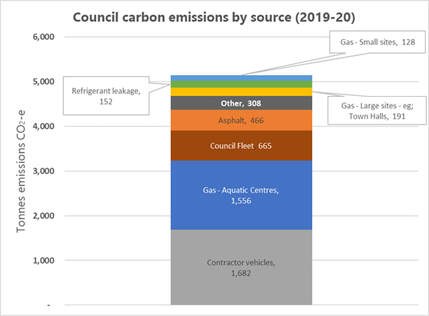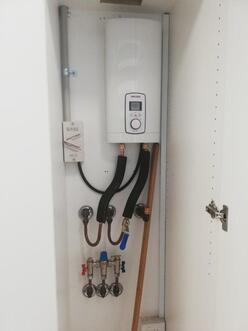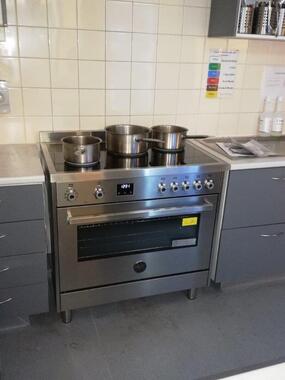What is driving action to get off gas in Yarra?Yarra City Council has long had a strong focus on action to reduce operational greenhouse gas emissions, achieving a reduction of more than 70 per cent since 2008/09 and holding carbon neutral certification since 2012.
Since 2019, all of Yarra's organisational electricity needs have been met by 100% renewable electricity through rooftop solar generation across 38 council sites, and grid supplied electricity via the Melbourne Renewable Energy Project (MREP). The focus since then has been to further reduce the organisation’s emissions by transitioning away from gas. Gas comprises around 36 percent of total emissions (see chart below). Yarra's gas-related emissions arise from gas used at leisure centres, other large sites such as town halls and offices, and many smaller sites such as sports pavilions, childcare and maternal and child health facilities.
|
CO2 heat pump at a sports pavilion in Yarra.

Based on this emissions profile, gas is the first priority to make serious emissions reductions. Being Scope 1 emissions, Yarra has a high level of control to make changes to reduce these emissions. Contractor vehicle emissions are indirect (scope 3) so Yarra has far less control over implementing emissions reductions activities.
The original push for Yarra to get off gas came from a Notice of Motion from Councillors requesting an options paper for getting off gas. Having Councillor-led drive supports strong action and commitment throughout the organisation. Building on this, a strong statement on getting off gas was incorporated into Yarra’s Climate Emergency Plan: Ensure all existing Yarra Council buildings are highly efficient and zero emissions by: Yarra City Council is developing an organisational action plan with consideration of a target to achieve zero emissions, without offsets, by 2030.
|
What has happened so far? In 2021 Yarra commenced electrification of small sites such as neighbourhood houses, childcare centres, and pavilions. Electrification of all 20 Council-operated small sites, is projected to be mostly completed by the end of 2021. This includes upgrades to heating, hot water and cooktops from gas to electric.
Design work is underway for more complex, large sites including town halls and leisure centres. At Richmond Recreation Centre, the dry area HVAC renewal has been designed to ensure it is compatible with a fully integrated heat pump heating and cooling system to be installed in future, rather than a standard like-for-like renewal. Yarra is actively sharing their knowledge to assist other Councils in accelerating the transition off gas. This includes numerous presentations at webinars and sharing Yarra’s detailed feasibility and investigation report into getting off gas at Richmond Recreation Centre. Design work is underway for major HVAC upgrade / renewal that includes electrification at Richmond Town Hall, Fitzroy Town Hall, Richmond Recreation Centre. What’s next?Yarra will continue to fine tune designs and costings for electrification of at least one of Yarra’s leisure centres by 2025.
This is the aim but will be dependent on budget and technical solutions available. Yarra will also continue to transition their vehicle fleet to electric or other zero emissions technology such as hydrogen. Instantaneous electric hot water system at a youth centre.
What have been the benefits?
|
What have been the challenges?The engagement with users has taken time – they need reassurance that new systems will perform well and confidence that the operational risks and needs are fully understood. One of the concerns from multiple facilities was how they would cook meals during a blackout. These were able to be addressed with the advice that, unless the building is a relief centre and equipped with backup power, even gas stoves should not be used for safety reasons.
Change can bring risks and perceived risks. It was crucial to engage with facility managers to ensure the unique operational needs of each facility were fully understood. Getting all stakeholders on board took time, patience and open dialogue, including addressing misunderstandings about how existing or new systems would work. As other councils have found in the past, consultants have not always enabled this kind of work - they've taken a conservative approach and said that the technology is not mature yet, "we're not ready - you can't do it". Having internal expertise has enabled Yarra to overcome the challenge of consultants not being fully up to speed with emerging technologies. The Sustainable Energy Officer role has provided crucial internal expertise to not only support internal staff, but also drive consultants to embrace the significant ‘getting off gas’ work that is an emerging focus, not only for Yarra but for other councils. Retrofitting is more challenging and costly than installing in new buildings. The kitchens in small sites presented a technical barrier because there were no commercial induction stovetops on the market when upgrades commenced. Induction stovetops are preferable to conventional electric stoves for safety and speed. Yarra opted for high quality residential induction stoves because they were available in the same sizes as the commercial stoves. The warranty for the residential stovetops originally didn’t cover commercial use. Yarra was able to negotiate a full warranty with suppliers since the use in small facilities usage is closer to residential than it is to a commercial setting. One of Yarra’s induction cooktops installed in a community facility.
|
How is it being led and embedded in the organisation?The work to get off gas is being led by the Buildings and Asset Management team (BAM) with support from the Sustainability team.
The Sustainability team has undertaken initial research and conceptualization. The BAM team oversees implementation and factoring works into future budget requirements. A key initiative implemented was to trial a new role, a Sustainable Energy Officer, which was embedded within the BAM team, but reporting to the Sustainability team. This role has been highly successful in providing the much-needed capacity and technical support to enable the BAM team to deliver projects with optimal sustainability outcomes. The role has also been key in driving awareness and engagement of the BAM team in Council’s commitments to key work such as going off gas and overall commitments within the Climate Emergency Plan. Yarra’s Leisure team are engaged and on board, which is crucial, given most of the gas used is from leisure centres. The capacity and expertise of the Sustainable Energy Officer has helped to build relationships with key staff and take the time needed to address issues, gain trust and engage key staff in understanding the long-term drivers behind the need to get off gas.
|



